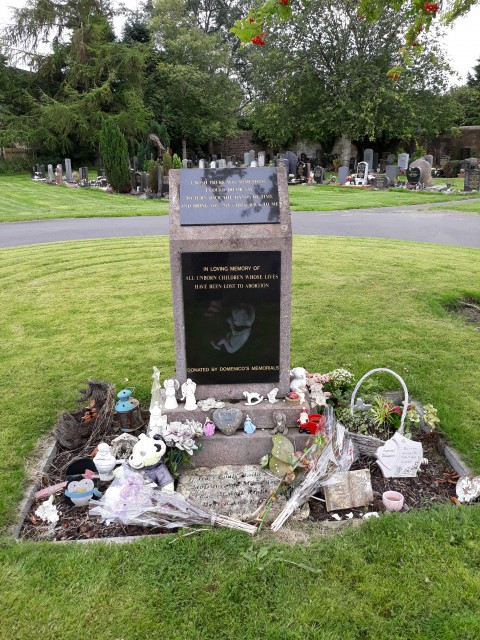December 1 | ![]() 0 COMMENTS
0 COMMENTS ![]() print
print

An oasis for those broken by abortion
SR AMDREA FRAILE tells of a place where grief can be expressed —By SR ANDREA FRAILE
Continuing November’s excellent practice of praying more intently for our beloved dead, I wonder if I might draw your attention to a beautiful memorial that stands in a fairly prominent spot in a circular patch of grass in Bent Cemetery in Hamilton. The inscription reads: ‘In loving memory of all unborn children whose lives have been lost to abortion.’
The memorial was erected at the request of the Hamilton SPUC branch in 1995. A member of the branch had just been to the US on holiday, and had come across not one but several memorials to the aborted unborn in various cemeteries throughout her travels. She put the idea to the group, who agreed to approach the local council and request that a similar memorial be installed in Hamilton.
Very much to their credit, the council readily agreed, and when the branch started hunting for a stonemason, one by the name of Domenico’s immediately came to the fore and offered to donate it.
I know that memorials such as these can be controversial. In Hamilton at the time, people were scandalised and objected that its very presence in the cemetery would cause some an unnecessary and unwanted guilt trip.
More recently, parishes have created memorial gardens for all unborn children – those who have died through miscarriage or stillborn – and the inclusion of children who have died through abortion has caused offence.
But surely this is unjust. An abortion decision does not exclude the presence of grief – far from it. It usually entails a far more complicated grief that, too often, never properly heals.
The fact of abortion means that somebody didn’t want the child, but that somebody is not necessarily the mother. Often enough, she herself wants the child very badly, but feels powerless in the face of explicit or implicit pressure from elsewhere.
In the aftermath, all she knows and remembers is that she signed the consent form, she submitted to the procedure. The blame, as far as she sees it, lies entirely at her door. Yet she does not bear the full responsibility of what happened, as St John Paul II clearly stated in Evangelium Vitae (section 99).
In any case, the point is this: countless women and men grieve the death of their aborted children and it’s entirely hidden. Society does not acknowledge, quite simply, that there should be any grief at all; friends and family want to spare their loved ones’ unwanted distress. And so it never gets mentioned and the wound becomes deeper. It’s a grief of the worst kind: there’s no funeral, no headstone, no anniversary to share with others, no photo to keep on your phone or in your purse to say, ‘This is my son’, no possession of theirs to treasure. Theirs is a haunting, never-properly-graspable pain. The memorial in Bent Cemetery gives people broken by abortion an opportunity to express their grief and let their tears flow.
Where else can they acknowledge that their children lived, even for a very short time? It’s a place to go to, and we all know how important that can be.
Even if we’re not especially inclined to visit the graves of our family members, we often like to visit places associated with them and places they loved, places we spent time together. (My Dad’s ashes rest in a crypt in a church in Madrid, but I only have to go to Largs to hear him telling me to breathe the glorious air and marvel at the Clyde.) It was Margaret Cuthill who took me to Bent Cemetery the first time. In her many, dedicated years of healing people hurt by abortion through her work in ARCH (Abortion Recovery Care Helpline), she would often take her clients there to help bring them some kind of closure. It was she and a few others who chose an additional inscription on the Hamilton stone: “I wish there was something I could do or say to turn back the hands of time and bring you, my child, back to me.”
So if there’s any talk in your parishes or local cemeteries of erecting such memorials, I appeal to your
generosity of spirit and understanding. The aborted unborn more than deserve formal recognition of their existence; and it will do untold good for those who grieve their loss.
Over and above that, however, my prayer is that – on this 50th anniversary year of the passing of the Abortion Act, when we reflect on the unspeakable number of lives lost to abortion and hearts torn apart – each of us might become that oasis in an otherwise parched land in which broken souls can pour out their story and grief without fear of misunderstanding and judgement.
We all know that memorials are a good thing. An infinitely better thing is a person who cries with us and feels the pain with us, because that’s when the road to healing begins.
– If you, or anyone you know, is hurting from abortion, please contact Sr Andrea at:











